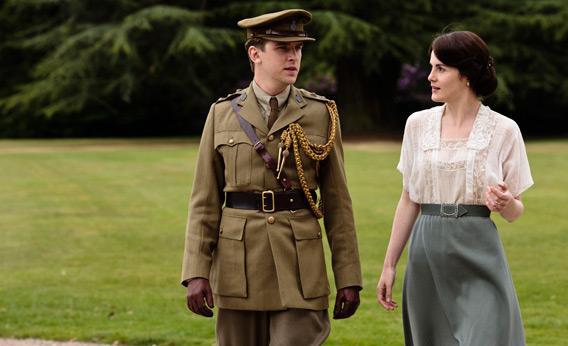The PBS drama Downton Abbey, which follows the Crawley family in World War I-era England, has captured American audiences. One aspect of the show, however, is troubling Slate readers—Captain Matthew Crawley seems to spend more time at home than at the front. How much leave did British officers get during the Great War?
One to two weeks per year. According to historian and World War I chronicler Michael Stedman, a British soldier’s leave allotment depended on rank, hometown, and the state of the conflict. Generally, officers had two five-day leave periods per year, while noncommissioned soldiers got only one. Leave periods were extended to seven days for soldiers from Scotland and remote parts of England to account for the difficulties of travel. (A death in the family or the birth of a child also extended the leave period to a full week.) There was some friction in the ranks over the regional differences in leave allotment: Residents of southern England complained about shortened vacations, while those from the hinterlands griped that it was nearly impossible to get home and back in a week.
The military didn’t always follow the vacation policy to the letter. Leave was somewhat irregular in the early years, before mutinies in the French forces during the spring of 1917 forced Allied higher-ups to get serious about vacation time. The British Army never allowed more than 2 percent of soldiers to be on leave at any given time, though. And emergencies frequently cancelled leave, even toward the end of the war. When the Germans pressed an offensive in the summer of 1918, for example, few officers got to go home.
A captain from Yorkshire, the setting of Downton Abbey, would have faced a long and arduous journey home from the front. He’d have made his way from the battle lines to a rail station, traveled by train to Calais, hopped a steamer to Southampton, and taken at least two slow trains to London and then Yorkshire. The trip would have left him with, at most, four days at home during his leave.
While Downton Abbey may seem to exaggerate the amount of vacation a World War I soldier received, it’s hard to gauge the show’s historical accuracy. The first three episodes of the current season span multiple years, so it could be that the story picks up during those brief intervals when Matthew happened to be at home. It’s also possible—although somewhat unlikely—that his role as an aide to a General would have earned the captain some extra leave.
If anyone in the series is getting too much vacation time, it’s probably William Mason, Captain Crawley’s soldier-servant. Around that time, an officer’s personal servant was known as a “batman.” A servant’s one leave period per year could have been scheduled to overlap with his boss’ vacation, but there still would have been times when Crawley traveled home without his servant.
Many soldiers from Yorkshire and similarly distant locales didn’t bother to go home during their brief vacations. They either went to London, or took advantage of the leisure offerings of Paris. World War I was a booming time for Parisian bars and brothels, so much so that one officer reported being mercilessly teased for failing to bed a prostitute during his leave.
Got a question about today’s news? Ask the Explainer.
Explainer thanks Gary Sheffield of the University of Birmingham, Michael Stedman, author of Great Battles of the Great War, and Dan Todman of Queen Mary, University of London.
